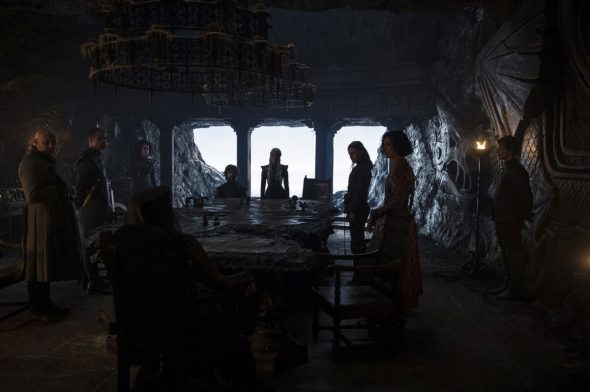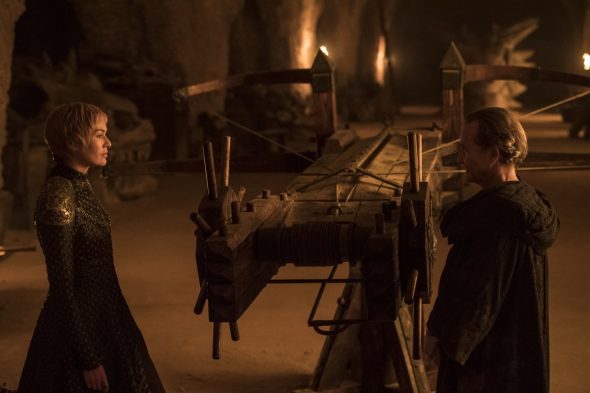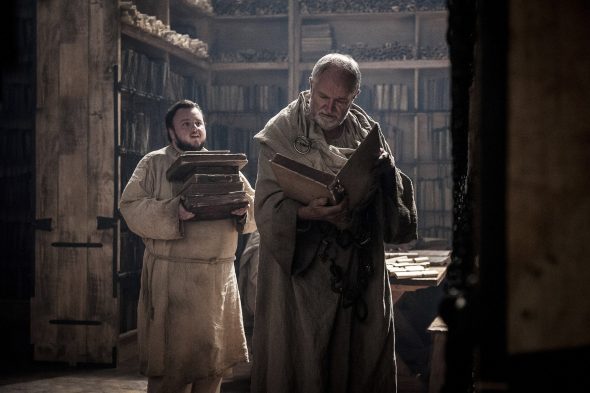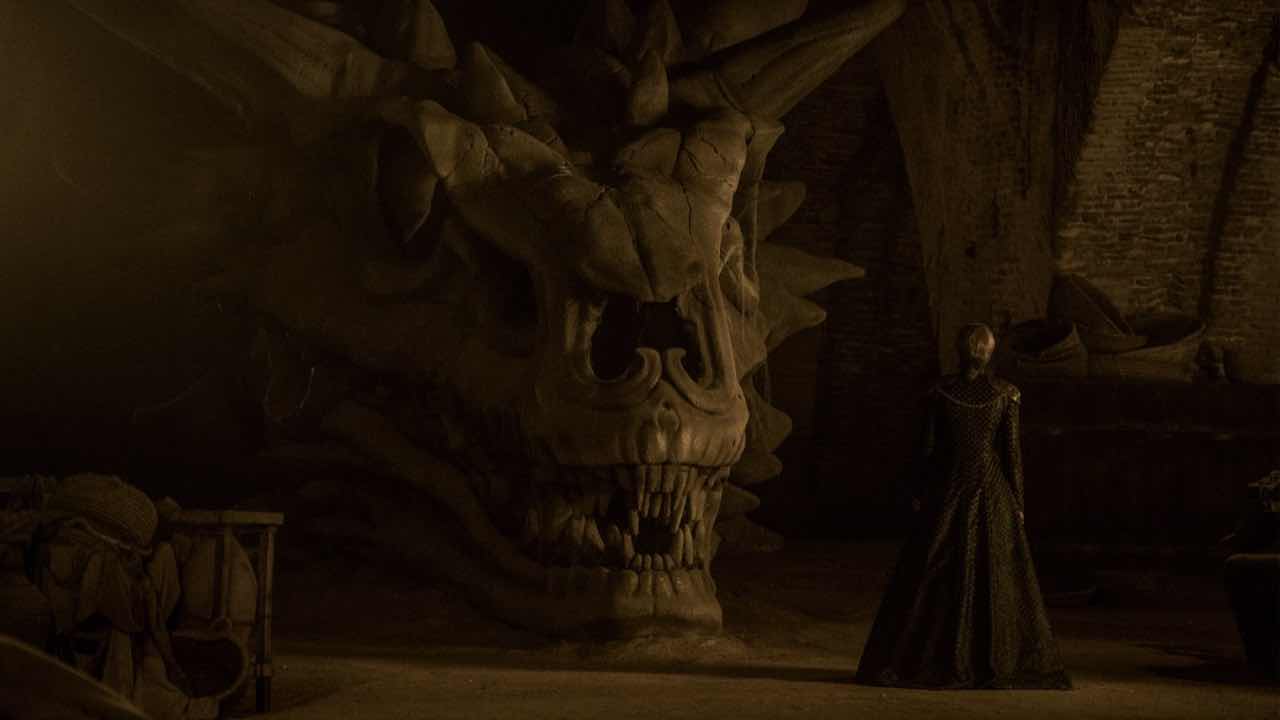We’re delivering our Game of Thrones recaps in a series we call Game of Thrones Unlocked. These articles will contain spoilers through the episode under discussion. This week, Jordan Stokes tackles “Stormborn” (Season 7, Episode 2).
It seems that we are well into the Endgame of Thrones. Everything that’s happened so far has been leading up to the climactic battles ahead. But soooo much has happened so far! And the show runners seem to assume (not without justification) that their audience might have lost the thread a bit.
Last week’s episode felt very much like a “getting the chess pieces onto the board” kind of episode: geographical bases of power were laid out, with Jon Snow in the North, Daenerys in the South, and Cersei in the middle. (As geography goes, this analysis is a bit crap—Dragonstone is East-Northeast of King’s Landing—but whatever.) None of these power bases is uncontested, but with the possible exception of Jon’s—Littlefinger is not to be counted out—none of them is seriously in doubt, either. I have a very hard time imagining a road to the finale that doesn’t involve these three leading their current armies into battle with each other.
But one is very slightly tempted to ask why we should care. Not just because the zombies present a more pressing threat, but because once we see all the cards on the table, it just doesn’t feel like it’s going to be much of a fight. Cersei vs. Jon might be a decently fair matchup, but it feels like Dany should be able to roll right over Cersei. And if Dany and Jon join forces, as seems nearly inevitable, then it just gets comical. Do we really need twelve more episodes for this?

Begin, already.
So if episode 1 was meant to set up the rest of the season logistically, episode 2 seems like an attempt to set up the rest of the season emotionally. Because there are reasons that we should care, after all. We’re reminded, by Randyll Tarly, that the Lannisters orchestrated the Red Wedding. We’re reminded—by both Olenna and Hot Pie—that they blew up Margaery Tyrell (along with a whole bunch of less interesting people). We’re also reminded, essentially by Lena Headey, that Cersei can project a blend of power, wickedness, and charisma that is oodles of fun to watch. Even if the outcome seems a little predetermined, do we want to see Cersei finally get what is coming to her? I mean: probably.
But the show runners didn’t leave it at that. They also invent a whole bunch of essentially new reasons for us to care about what’s going on.
Some of these involve trying to make the central contest more interesting. Over the past few seasons we saw Cersei kind of fall apart as a character. If you go back over her track record, she seems to be terrible, just terrible, at being in charge. She trusts the wrong people, empowers the wrong people, alienates the wrong people, and can generally be trusted to make the absolute worst decision as a reaction to any given crisis. This would make the coming battle even more lopsided. So this time we’re shown the confident, competent version of Cersei, saying basically all the right things to turn the Westerosi lords against Daenerys. (And may I say: thank goodness. Cersei’s so much more entertaining when she’s not holding the idiot ball.)

Hit me with your best shot.
But even if Cersei is bringing her A-game, the Unsullied are supposed to be quite simply the world’s greatest soldiers. How is that not game over right there? Well, we’re informed that Randyll Tarly, Sam’s castrating dick of a father, is on the Lannister’s side—and now he’s supposed to be the greatest general in Westeros for some reason. But Dany has her dragons: isn’t that still checkmate? No no, Qyburn tells us, we have a Top Secret Anti-Dragon Countermeasure. (Although I kind of wish this had turned out to be something more interesting than “a somewhat-larger-than-average crossbow.” Was anyone else hoping for Qyburn to fuse the dragon skeletons into an alchemically powered monstrosity of some kind?)
And some of it involves giving us new characters to care about. This is done pretty clumsily, for the most part. We were all relived when Ramsay Bolton finally ate it last season, right? Not just because we wanted to see him get killed, but because his grinning pyschopath act was getting kind of played out. So I am not super enthused about the show’s attempts to slot Euron Greyjoy into the Ramsay-shaped hole in its roster. (“Hmm, how can we make sure everyone knows this guy is evil: ah! Let’s have him brutally kill some women and then sexually menace some other women.” Can we just not, at this point?) But okay, Game of Thrones, having stuck with you this far I guess I will grudgingly agree to hate Euron’s guts. Fine. Fine.
I will also stipulate to feeling tenderly anxious concern over Missandei and Grey Worm, whose astonishingly character-grounded and non-pointless lovemaking in this episode basically set up one or both of them to get brutally killed at some point in the near future. For all that Game of Thrones has kind of a thing about killing off major characters, if it was really just down to Jon, Dany and Cersei, we’d have nothing left to worry about. But Grey Worm and Missandei are in that sweet spot: major enough characters that we’d care, minor enough that the narrative wouldn’t collapse in their absence. What was the line? “I did not know fear, until I met Missandei of the Isle of Naath.” Yeah, you and me both, buddy.

The best thesis defense is a good thesis offense.
But although you can kind of see the writers running around in the background greasing the plot machinery and powering up the heartstring-tuggers, this episode did the job that it was supposed to do. I feel a little manipulated, sure, but I do find that I care a lot more about the rest of this season than I did at this time last week.
I do want to talk about one more thing here: Samwell Tarly, who seems to be starring in a delightful little sitcom all of his own about how bad it must have sucked to go to Med school in the high middle ages. Ye Olde Scrubs, or something like that. (Tag us on social media if you think that Ye Olde Scrubs is a much better idea for a show than Confederate.) Sam has had bugger-all to do with anything that’s happening in the rest of the plot. But his scenes in both of the episodes stand out so much! They’re so gross, why would you put all that pus and poop and blood and grimacing into scenes that have so little meaning?
I think the show has kind of painted itself into a corner with Sam and Jorah, two characters who evidently have roles to play in the endgame (or they’d simply have vanished), but who have been sent on missions that can’t really have any bearing on the rest of the plot. If Jorah just popped up in Daenerys’s throne room one day, and was like “Hey I cured my Greyscale, would you believe witch hazel?” this wouldn’t satisfy us. Right? And although I don’t think it would be quite as much of a problem, there’d be something a little off-putting about a scene where Sam just show up at the Wall wearing a Maester’s chain three episodes from the end, full of stories about how drunk he got at the Freshman Formal. These characters are both supposed to be going on quests. They are transforming themselves. And transformation takes, well, pus and poop and blood and grimacing (or rather, it takes effort and risk, which is what all of that stuff is basically standing in for). In as condensed a timeframe as possible, the show is trying to sell us on the idea that Sam’s education and Jorah’s cure are victories that have been won, not simply nice things that happened to happen. Once again, the show is giving us reasons to care.
Now, there is a whole separate discussion to be had about that Arya scene with the direwolf. I won’t be touching that in this post — maybe I’ll write a follow-up later this week, or maybe we can hash it out in the comments.
There is not really a discussion to be had about the Evaded Title Drop that the show served up with “A History of the Wars Following the Death of King Robert the First.” But yes, writers, we do see what you did there. Good job, have a biscuit.

We’ve had Samwell Tarley on our screens for many years now, but why? He may have had some narrative value to humanize John in the early days on the wall, but 4 minutes of him would have done that well enough. At this point we’ve seen hours of Samwell subplot, with the writers scraping around to justify piling on more. Even now that each episode is 10% of all that’s left, who gets put on our screens? Samwell Fucking Tarlery.
What’s worse is that in order to make Samwell seem like he has something of value to do, writers need to make everyone around him a buffoon – even people who shouldn’t be, like the learned meisters. You would think that with the near-simultaneous arrival of dragons, winter and white walkers, they’d be putting their immaculately researched multi-level contingency plan into action. It’s for times like this that Westeros even has meisters. But no, the plot calls for the bumbling Samwell to outmeister them in the first week of his internship – forcing us to conclude that they are morons, misanthropes, or both.
It would have been so much more satisfying if they dispersed to all the centers of power to give everyone a briefing about what exactly is up, what their options are, and how they might best not die. They are the scientists of the show. Why are they also the show’s biggest idiots? Imagine that climatology’s equivalent of Samwell Tarley – some awkward larper subredit undergrad – realized that CO2 is a greenhouse gas, and all the real climatologists were like … “Well sure, yeah, we knew that for years, but pffft, that kind of shit is none of our business. We’re just buying up some property in Canada; we’ll be fine. What else did you expect from us?” Those are basically the meisters of Westeros. And they had to be written this way, so that Samewell Fucking Tarley has something to do. Just catch greyscale already.
I disagree with you about the Maesters relative level of competence to handle this problem. In fact, I’d argue that the Maesters are going to be the very *last* to accept that the White Walkers are coming.
Keep in mind, Samwell doesn’t have to “outmaester” anyone to know about the White Walkers – he’s seen them with his own eyes! He’s Sam the Slayer, and just by virtue of his personal experience he is among Westeros’ top 10 most qualified people to assess the threat of the White Walkers
In contrast, the Maesters are the skeptics, the one that disapprove of fantastical tales and want hard evidence. Dragons are verifiable historical fact, the last having died relatively recently, and the evidence of their existence has a nice new arrow hole in it as of this episode. But the White Walkers can be written off as myth, a legend from a thoursand years in the past. The maesters probably seem them as just some distorted tale of a long-past invasion of wildlings, inflated into an existential threat by puffed-up Northern kings. Even if they think the White Walkers WERE real, they have no reason to believe that they’ve returned this winter, other than some wild ravings from half-mad refugees from the Night’s Watch.
More to the point, the Maesters’ entire power base is predicated on a rational world where their knowledge makes them valuable. They have the most to lose if magic returns to the world. The common folk and even the Lords of Westeros have never seen a White Walker and are probably willing to lump them in with grumpkins on a day-to-day basis, but they are not ideologically opposed to the existence. The Maesters have built their life around an ideology that can only grudgigly permit White Walkers to exist, so they’re naturally going to be skeptical (it also helps that they are about as far south as you can get in Westeros, so the threat feels the least real to them.).
As for the narrative purpose of Samwell, I think you’re underestimating the role he has played. First, he’s had a pretty significant character arc himself – while he’s still not a fighter, he’s a far cry from the mewing wimp that we saw in S1. Second, he’s our window into the world of the Citadel, and is probably going to be crucial in unearthing whatever Oldtown-related plot is coming our way. Game of Thrones has pretty much never, as far as I can tell, just hard-cut to a new character or setting. They almost always take an existing character and send them somewhere new, so that we the audience can view it with familiar eyes. E.g. we didn’t see the Iron Islands until Theon went there, or the Free Cities until Arya did, etc. If we’re going to introduce Maesters, Samwell’s the only way to do it.
In addition to Ben’s comments above, I can think of another good reason for Sam’s storyline, which builds on a point Ben made in his article about the constitution of Westeros: https://www.overthinkingit.com/2016/04/20/the-constitution-of-westoros/.
That reason being: the maester at Castle Black represents the intersection of two of the sworn brotherhoods in Westeros (the other example I can think of being the Faith Militant, which recently went through a Cersei-related personnel kerfuffle). Maester Aemon and Jon have both demonstrated the tension between the idealization of the Night’s Watch as a nonpartisan institution beyond Westerosi politics, and its reality as a group of men with ties to the south that a black cloak can’t obscure. Aemon and Jon have given us two answers to the “question of the raven from the south”: keep your vows and torment yourself, or break your vows and go back to the world. The storyline of Ser Alliser Thorne also shows us that the Watch itself is an institution with an agenda influenced both by the Lord Commander and the rank-and-file brothers, but its influence as an institution has so far been as a gatekeeper. Many, most prominently Barbry Dustin, have pointed out the similar role of the maesters as powerbrokers in Westeros, despite their
Sam started as a brother of the Watch, but after Aemon died and Jon came to rely on him (Sam) more, he took on the de facto role of maester at Castle Black. Unlike Aemon, who was a maester first, Sam has gone in the other direction, taking the black before the chain. His return to the world shows us the first example, as far as I know, of someone trying to be a “brother in the world”, keeping his vows to orders in both the south and the north, but interacting in meaningful ways with people from the world beyond. For example, if Jorah gets through his geological depilation treatment, we can expect him to try to make things happen Dany-wise, and that will have been directly as a result of Sam’s decision to heal him.
None of that is a comment on Sam’s entertainment value as a person, of course. But it is a big part of why I enjoy watching him as the person who inhabits his roles.
oops. End of third para: “Many, most prominently Barbry Dustin, have pointed out the similar role of the maesters as powerbrokers in Westeros, despite their de jure neutrality.”
I’ll be a fellow dissenting voice.
Sam has some major character design issues. It’s like GRRM designed him as a trolling version of a d&d character. Strength, Stamina, Charisma, Courage, down to 0… Intelligence set to 1 (but with “literate” as an inherent bonus).
And then plus 100 to every luck roll.
He’s entirely passive for every major plot in the series, but keeps getting Deus ex Machina solutions based simply on luck rolls.
(Can Sam survive to adulthood without his father killing him? Nope, nope, nope, nope… Luck roll = Yes! Move on to Night’s Watch. )
(Can Sam make it as a member of the Night’s Watch? Nope, nope, nope, nope… Luck roll = Yes! Gain trait ‘friends with Jon Snow’. )
Etc. Etc.
That’s not entirely an irredeemable character… for a different series (see Rincewind, Arthur Dent, Inspector Clouseu).
But GRRM makes such a point of “no one has plot armor!” that it’s glaringly obvious when he creates an “exposition boy” (like Sam & Bran) to tie the background mythology into to main story.
Samwell is definitely in somewhat of an awkward position story-wise, but I think there’s an interesting corollary here to the books and the rest of the cast (it might also be fun to see how this storyline plays out in the books with accompanying differences to the show and their differing concerns) that’s worth exploring—bear with me.
I’m not going to pull out the quote, but GRRM is widely attributed as saying something to the effect of—and I remember Fenzel talking about this at least once or twice—the reason why he spends so much of the books describing details of houses and describing feasts is because politics are so important to the lands major players (who we are following), and food is one of their few pleasures—along with sex, but that’s another discussion—that is experienced in a quotidian way.
So, what does this have to do with Sam? Well, the show hasn’t been focusing on these details in quite the same way the books have, for some fairly easy reasons: food doesn’t quite hold the implications it might on another show (say Hannibal, RIP), big burly men tearing into food isn’t super cinematic, and because it’s a visual medium with a complex story/world they need to condense, simplify, and focus on the plot. Sam’s story in the citadel is filled with the everyday activities and drudgery that we haven’t really focused on since the early days of The Nightswatch (to my—admittedly—hazy memory) and are a far cry from the other storylines.
I’d like to propose that the show and it’s fantastic match-cutting and quick-edit-drudgery sequences (surely there’s a film term for this) are attempting to illustrate some of the reasons why the Maesters are the way they are, how they are disconnected from the daily struggles of those they serve (Qyburn along with Sam is good food-for-thought here as exceptions), and why they might not be so quick to warm-up (hah) to the White Walkers.
Food, previously a pleasure (although I guess not quite as much for Sam, being from The Wall) is simply another part of the drudgery of The Citadel: it’s uninteresting, it’s bodily, it oozes and sludges, and most importantly it’s regular and not a concern. For the rest of Westeros, food is a going concern and not a given, it’s what wars are fought over and crimes committed for, it’s a pleasure and a treat in a harsh land. Hotpie basically survives and is liked on his food skills. This, then, goes some way to explaining the disposition of Maesters as a whole: they’re disconnected from the daily highs and lows that the rest of the continent experiences, they’re not out adventuring and surviving, they’re either staying sedentary in Old Town (take a look on the map next episode and look at how secluded it is) or serving a lord, burying themselves in books and generally, one might argue, missing the trees for the forest.